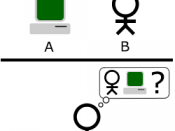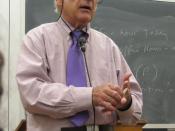Jake Radowski 1047 words
Could a robot possess genuine understanding and intelligence? Discuss with relation to Searle's Chinese room thought experiment.
In the contemporary age, as computing technology has advanced, many have differing beliefs as to whether the gap between a human's and computer's ability to think has become one and the same. The Turing test notions are often brought forward by those who believe that computers will one day possess genuine intelligence or a mind like that of a human's. I will bring forward John Searle's Chinese room thought experiment, which sets out to prove a computer may be able to pass the turing test, but it has not gained the ability of genuine understanding. In my essay I shall argue how John Searle's room experiment effectively refutes the turing test proving that a robot cannot possess genuine understanding and intelligence due to lack of adaptation for survival capabilities.
I will also explain the syntax /semantics argument and the necessity for an object or being to possess both in order to be a genuine thinker.
In the turing test, Turing proposes that if a machine that is unbeknown to a human that it is a machine responds to a human through a response linguistically and fools the human into believing it is itself human, that genuine intelligence may be attributed to the machine and it has gained the ability to 'think'. � John Searle with his Chinese room experiment establishes that if a computer passes the turing test, it's understanding of the issues fed to it are non-existent as the computer is not truly thinking as it is simply obeying a set of commands and rules without an actual understanding of what they mean. One of Searle's key arguments refuting the "Turing Test" theory is his claim that "Brains...


